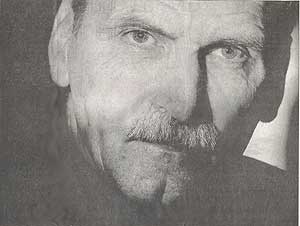

He's
seen the devil:
Our fascination with Romeo Dallaire

Our fascination with Romeo Dallaire

What is it about Romeo Dallaire that is catching the interest of so many Canadians?
When Mr. Dallaire, the retired Canadian general, spoke in Victoria at the end of November, I was in the audience. I went to hear him because I was curious to see this man about whom I had written earlier and because I had a question in my head. I have long been wondering why it is that he manages to capture the interest of the Canadian public.
In the media he was, at first, portrayed as a helpless and inept general who, in Rwanda, "took to wandering out alone in search of an accidental death." Even amidst applause for his new book, he continues to be described as something of a hollowed man. A recent National Post headline declares that he is "still battling (his) own internal demons," and Stephen Lewis, in his review of Shake Hands with the Devil, talks about Dallaire as someone who "staggers through life." Other reviewers feel obliged to remind readers that "in July 2000, (Dallaire) was found unconscious and drunk in a park in Hull."
But the man I saw walk into the room to a standing ovation didn't fit this image at all. Standing tall, he gave an articulate and persuasive talk that, while drawing on his own experience, training and historical knowledge, drew attention away from, rather than toward, him. While readily admitting his powerlessness to deal with the situation as it erupted on the ground nearly 10 years ago in Rwanda, there is no lingering sense of fragility, no excuse-making, no grandiosity and no ineptitude.
Speaking only in passing of the emotional toll of such experiences -- and using the old military term "shell shock," as he acknowledged a corporal's recurrent memory of a child's exploding head after being shot -- Dallaire paid little heed to things psychological: neither his nor others'.
Clearly, he is no longer the celebrity "poster boy" for post traumatic stress disorder that he was once made out to be.
So what is it that garners such interest in this man?
We all share a degree of morbid curiosity or a pseudo-empathic walk-a-mile-in- my-shoes notion about the horrors of the massacre he couldn't stop. But I don't think that people are after his descriptions of the putrid smells of death, the bodies half-eaten by wild dogs or the sexually mutilated children, all of which he mentions only in passing, sparing the audience (and perhaps himself).
And while most of us have a modicum of distrust, even dislike, of the major world powers, I can't believe that people are lining up just to hear Dallaire's factual details of the machinations of the world powers that, dominated by self- interest, saw no strategic value to Rwanda, so they allowed the genocide to take place. "All there is here is humans," he quotes bureaucrats as saying after assessing the situation in the first week of the killings.
And Dallaire's appeal is not just to America-bashers who seek more fuel to feed the faddish Bush-bashing going on around the world. Granted, Dallaire does not go lightly when speaking about the U.S.'s role in Rwanda or Haiti, or Somalia, or Yugoslavia or Iraq, but he does so not to lash out at America but rather to identify the reasons for the tragic endings to so many altruistic missions.
Even Madeleine Albright, Bill Clinton's ambassador to the United Nations, acknowledges in her memoir, Madam Secretary, that the United States did set the tone, preventing the Security Council from stopping the genocide.
While cumulatively these factors might account for Dallaire's appeal, there is, I think, something else about this man that makes him a magnet. That something says as much about us as Canadians as it does about him.
Right now, we're desperately in need of a Canadian hero, someone who can help us with our diminishing international identity. In recent years, Canada has come to be somewhat like a child, wandering aimlessly around the global schoolyard, excluded from the group of bigger kids. We're increasingly nervous about a growing rift between us and our big, powerful friend and neighbour, the United States, and about the way our old friend and blood relative, Britain, is choosing to pal with the U.S. instead of with us.
In our uncertainty, Dallaire challenges us to focus not on how they are excluding us but rather on how we can bolster our own identity as "leader of the middle powers." "Big powers," he says, have lost "the ability to get into the guts of those people (the Rwandans, Iraqis) the way we as Canadians can." Exalting our unusual Canadian skills of talking, listening and "communing" with others, he says that it's "high time we decide we are here."
When I walked out of his talk last week, it was with an answer to my question that surprised me. Dallaire captured my attention, and he captures the attention of Canadians, because he gives us hope that, as a nation, we'll manage to carve out and maintain our own identity.
Perhaps it is high time we stopped talking of Dallaire as he is still so frequently portrayed in the media. He is a strong man: Referring to him as a staggering casualty will only serve to weaken his message. Canada, it seems, really does have a future, and maybe a new hero.
tanadineen.com
@ Dr.Tana
Dineen
1998-2007
by
Dr. Tana Dineen, special columnist,